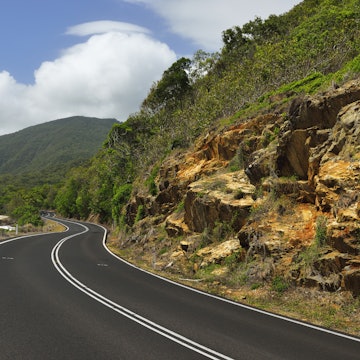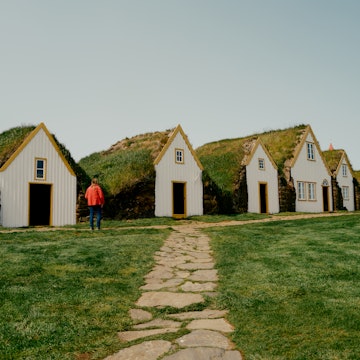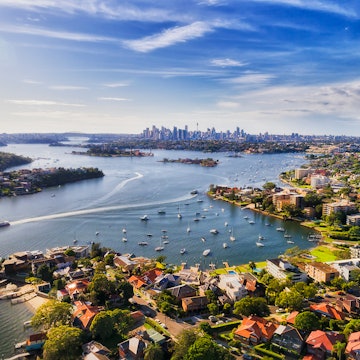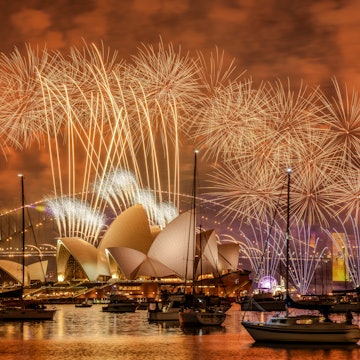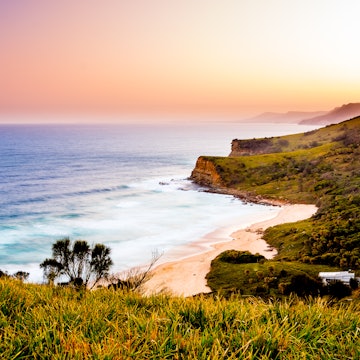

Australia’s coast was just made for road tripping. Thousands of kilometres of sun, sand and surf, dotted with lazy beach towns, quirky accommodation, big things (pineapples, prawns, what have you) and enough fish and chip oil to fuel a few weeks of open-road adventures.
However, choosing between the East Coast (typically Sydney up to Far North Queensland) and the West Coast (Perth up to Exmouth or down to the Southwest) for your Australian road trip experience is no easy thing. Want to swim with the whale sharks at Ningaloo Reef? Go West! But you don't want to miss out on Byron Bay...? You need to do the East Coast. Lucky is the traveller who has time to do both (or a lap of the map!) but for the rest of us, here is a little helping hand for making the decision and sorting out your Australian coast trip paralysis.
The East Coast has more infrastructure than the West Coast of Australia, it’s like choosing between Europe and Africa or England and Scotland. There are more places to rent cars, more tours to join, more spots to stay, more places to eat on the East Coast... but both have plenty for you to see and do.

Tackling the East Coast
The route is best divided into two or three trips (if you have time to take a break) or one really extended journey, depending on your time frame. Fly in or out of Sydney, Brisbane, Cairns or the Gold Coast. An exciting alternative or add-on itinerary not detailed here but is covered in the Lonely Planet Australia guide is Cairns north to Cooktown (330km) which requires a 4WD, or all the way to the tip of Cape York.
Sydney to Brisbane (1055km)
Once you’ve finally made it out of the Sydney traffic, the Pacific Highway will take you via the low-key beaches of the Central Coast (we love unspoilt MacMasters Beach and picturesque Soldiers Beach at Norah Head) through the Hunter Valley, Australia’s oldest wine growing region. After you’ve drunk your fill of its fine semillon and shiraz (OK not you, driver) and indulged in a little too much smelly cheese on one of the many wine tours, it’s only an hour drive to Newcastle. Newcastle has come into its own as a hipster beach town with some dynamic galleries, fantastic food, funky boutiques and of course, damn fine surf.
Wildlife lovers will want to stop at idyllic Port Stephens, home to around 150 bottlenose dolphins, plus migrating whales during the winter. And if you’re concerned you have yet to see a ‘big thing’ yet fear not, the Big Banana is waiting at laidback Coffs Harbour with its expansive beaches and easy access to the lush hinterland of the Bellingen region. Further north, Byron Bay, at Australia’s eastern-most point, is world famous for its endless beaches, reliable surf breaks, fab restaurants and hippie-trippy vibe. Away from the coast, the magnificent scenery, organic markets and alternative lifestyles of the Tweed River – in particular the vibrant towns of Mullumbimby, Bangalow and Brunswick Heads, make this one of Australia’s most intriguing and appealing regions.
From here you’re a crystal’s throw from the Queensland border and the shimmering glow of The Gold Coast with its frenetic, Las Vegas-style nightlife and theme parks. After a big night out on the tiles, limp into dynamic Brisbane and fuel up with a couple of days of coffee and culture.

The Sunshine Coast (289km)
From Queensland’s capital, Brisbane kick off this coastal odyssey through the Sunshine Coast, a gorgeous strip of beach towns, fertile, subtropical forests and everglades as well as sweet hinterland villages. Enjoy seafood, shopping and cocktails by the water at Noosa and feed wild dolphins off the coast at Tin Can Bay. Just north of Beerwah is Australia Zoo, home to mini wildlife warriors Bindi and Bob Irwin (children of legend crocodile hunter, Steve) and animals ranging from koalas to Sumatran tigers. A couple of hours up the road and you’ll arrive at Hervey Bay, famous for its humpback whale watching and ferry access to the World Heritage–listed Fraser Island. A must-do on any East Coast tour is four-wheel drive the world’s largest sand island which features freshwater lakes, an ancient rainforest, and plenty of wildlife. There are plenty of tour groups going over if you don’t have your own 4WD.
Fraser Island to Cairns (1400km)
If you still have oil in your tank, continue north to Townsville, a minimum six-day drive, which captures some of Queensland’s biggest coastal attractions including the Great Barrier Reef. First port of call is the historic sugar cane city of Bundaberg, where you can snorkel and dive the coral cays of Lady Musgrave Island and Lady Elliot Island, home to a large population of manta rays. The beef-and-bush capital of Rockhampton is the jumping off point to the delights (under sea, on the sand and at the beach bar) of Great Keppel Island and the limestone Capricorn Caves. But save a couple of days for the 74 palm-fringed islands of the Whitsundays (organise your jaunt from friendly Airlie Beach) where you can dive shipwrecks, charter a sailboat, or maroon yourself on a remote beach for a couple of days.
Wind your way through the mango farms and sugar cane fields to the university and army city of Townsville where a brief ferry jaunt will deposit you at postcard-beautiful Magnetic Island, with its quiet beaches and excellent walking trails. From Townsville join the Great Green Way, a 350km journey that travels through 12 national parks and via 20 tropical islands including fascinating Hinchinbrook, Australia’s largest island national park. The journey ends in Cairns, a fun and unabashedly tourist town (with an international airport) that is only a two-hour drive from the gourmet delights of Port Douglas and the extraordinary Daintree Rainforest.
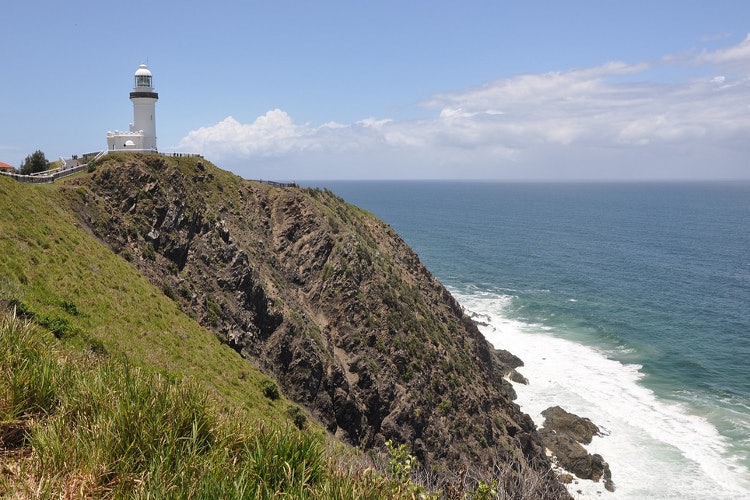
Go West!
These two Western Australian itineraries depart from Perth (the world’s most remote capital city) or its much-loved but somewhat eccentric neighbour Fremantle. With wonderful weather, dazzling Indian Ocean sunsets and an easy-going character, you might find it hard to actually get on the road and leave this region. But once you do, you’ll be wowed by all the West has to offer.
Perth to Albany (645km)
Surfboards and empty stomachs are all you need to pack for this fabulous road trip to the south-west. First stop out of Perth is Bunbury, a lively port city where you can enjoy an aquatic encounter with pods of wild bottle-nose dolphins. Take the Bussel Highway down to Busselton with its calm, family-friendly beaches and on to Margaret River, arguably Austalia’s most consistent and scenic surfing destination. There are more than 40 places to catch a wave in the area with conditions ranging from gentle beach surf to powerful reef breaks. Depending on the wind and the swell you might want to check out Cowaramup Bay, Boranup or Dunsborough.
The region is also well known for its food and wine – take your pick from over 100 wineries, as well as fine restaurants, boutique breweries, and fresh providores. Cape Leeuwin, near Augusta, is where the Indian Ocean meets the Southern Ocean. It’s a great place to join a whale-watching tour, or cruise the Blackwood River. The road diverts inland to the old timber milling town of Pemberton, in the heart of Karri tree forests. Drop into nearby Walpole, home of the Valley of the Giants Tree Top Walk, elevating you 38 metres above the magnificent tingle forest. Follow the Rainbow Coast down to Albany stopping in at Torndirrup National Park, where you can see The Gap and Natural Bridge – spectacular granite rock formations carved out by the Southern Ocean. The Albany Highway will speed you directly back to Perth in four hours.

Perth to Exmouth (2,940km)
Driving the Coral Coast is one helluva roadtrip even in comparison to the others listed here. You will need at least 10 days for this epic journey. Leaving Perth, the first big excitement is hitting the splendid Pinnacles Desert near Cervantes, which contains thousands of intriguing limestone pinnacles. Further north you’ll arrive in Geraldton, the perfect place to tuck into a smorgasbord of fabulously fresh seafood, in particular the famous western rock lobster. Then it’s time to pull on your hiking boots for some trekking through the rugged gorges at Kalbarri National Park. July to October is particularly beautiful here with over 1000 varieties of Western Australian wildflowers transforming the outback into a sea of colour. Make sure you visit the friendly, bottle-nosed dolphins who come in to be hand fed several times a day at Monkey Mia.
Next stop is the tiny seaside village of Coral Bay, home to World Heritage–listed Ningaloo Reef. Starting just metres from the shore, this fringing reef is teeming with unique marine life. Plan your visit for late March to early July, and you’ll also have the opportunity to swim with the whale sharks – the world’s largest fish. Nearby, Cape Range National Park offers rugged scenery of deep canyons, limestone ranges and spectacular gorges. If you have limited time you can fly out of Exmouth or retrace your tracks back to Perth. Alternatively, follow the sealed roads east to the increasingly popular Karijini National Park, or north to Broome, the Dampier Peninsula and the Kimberley wilderness.






